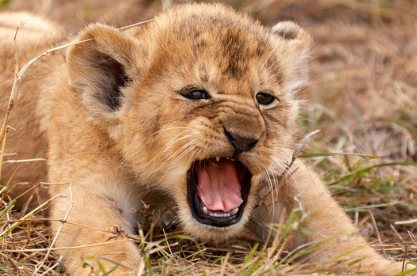
In a moment of raw, untamed splendor, a young lion cub takes center stage and delivers his very first roar to the world. This adorable yet awe-inspiring scene captures the essence of a future king in the making.
The cub’s courageous attempt at emulating his regal elders fills the air with anticipation and echoes the legacy of generations of lions before him. His tiny frame quivers with determination as he practices this primal expression of power, marking his journey towards becoming the apex predator of the savannah.
While his roar might still be a work in progress, this lion cub’s boldness and spirit shine through, offering a glimpse into the majestic future that awaits him. This endearing moment reminds us of the circle of life and the untamed beauty of the animal kingdom, where each roar, whether big or small, carries the weight of nature’s grandeur.
10 Mental & Physical Health Benefits of Having Pets
Pets are family members. Like humans, they need love, health care, and attention. But pet parents’ relationships with their pets are not one sided. Pets give so much back in return, improving the health of our minds, bodies, and hearts.
The benefits of having pets are plentiful — and scientifically proven. Pets help their humans live longer, happier, and healthier lives mentally and physically. The Human Animal Bond Research Institute (HABRI) gathers the latest information on the positive health effects of companion animals. These researchers help make the case for adding a pet to a household.
From reducing the risk of heart attacks to alleviating loneliness, these furry family members are contributing to healthy communities.
Let’s talk about those benefits.
Better Mental Health
Pets can contribute to positive mental health through emotional work and practical work. The emotional work can be described as alleviating worries, stress, and depression. You may have noticed that your pet wastes no time noticing and springing into action when you are upset or sad. Their intuition is what makes them great support and therapy animals, and animal-assisted therapy is effective in treating PTSD, anxiety, and depression.
Then there’s the practical work that comes with caring for a pet. This means making sure their individual needs are met. Developing a daily routine of walks and feeding times can help pet parents with mental health conditions feel a sense of purpose that affects other areas of their lives.
The Data: Pets and Mental Health
A 2016 HABRI study explored the role of pets in the social networks of people managing a long‑term mental health problem.
- Pets were found to contribute to a stronger sense of identity in pet owners with mental health conditions, including reducing negative perceptions of a mental health condition or diagnosis.
- Pets provide a sense of security and routine in the relationship, which reinforces stable cognition.
- Pets provide a distraction and disruption from distressing symptoms, such as hearing voices, suicidal thoughts, rumination, and facilitating routine and exercise for those who care for them.
Better Physical Health
Every little bit counts when it comes to physical health benefits, and those daily walks really add up for dog owners. Since they are more likely to meet the criteria for regular moderate exercise, dog parents have lower instances of obesity.
Your heart is one of the biggest spots to see the full benefits of pet ownership. Just the presence of animals has significant impacts on blood pressure, with pet owners having a lower resting blood pressure than people without pet babies.
Cat parents aren’t left out of the healthy heart race. A feline friend in your home reduces your risk of death due to cardiovascular diseases, including stroke and heart attacks. According to the Human Animal Bond Research Institute (HABRI), people without cats have a 40% higher relative risk of heart attack than non‑cat owners.
The Data: Pets and Physical Health
- Approximately 60% of dog walkers met the criteria for regular moderate and/or vigorous leisure‑time physical activity compared with about 45% for non‑dog owners and dog owners who did not walk their dog in a 2005 Michigan Behavioral Risk Factor Survey.
- In a study of adults over the age of 50 with mildly elevated blood pressure, the presence of a pet dog or cat had a significant impact on blood pressure, with dog ownership being associated with lower diastolic and systolic blood pressure compared to people who did not own pets.
- A study of over 2,400 cat owners concluded there was a significantly lower relative risk for death due to cardiovascular diseases, including stroke and heart attack, compared to non‑owners during a 20‑year follow‑up.
Healthier Aging Process
Research has shown that older adults get social and emotional support from their pets that combats loneliness and depression. Aside from promoting exercise and reducing stress, pets also assist in the treatment of long‑term diseases like Alzheimer’s and dementia.
Pet companionship is also key for hospital and cancer patients. When coupled with animal-assisted activities, pets help patients with pain management and in interactions with doctors and nurses. Those patients also responded better to treatments and reported improvements in their quality of life.
The Data: Pets and Aging
- Results of a study of older adults who live alone suggest that pet ownership may act as a buffer against loneliness.
- Results of a one-year study that examined the impact of animal‑assisted therapy (AAT) on patients with chronic pain demonstrated that, following AAT, patients reported reduced pain, discomfort, and stress. Additionally, stress among nursing staff was found to decrease significantly following AAT.
- A study of older adults with mental illness living in long‑term care facilities concluded that AAT reduced depressive symptoms and improved cognitive function.
When we look at the data on mental health, physical health, and aging, it’s clear that pets contribute much to people’s lives in these areas, as well as being the loving companions we’ve always known they are.










